If you follow all things Broadway, you know the last two weeks have been a whirlwind for Tony Award winner Lillias White (The Life) who is now playing the role of Hermes in Hadestown on Broadway. Lack of communication and a mistake have turned into yet another example of how no one is allowed any longer to err in our society.
So it was quite a surprise to me when in the late afternoon last Thursday I was asked if I could do an interview with White in advance of her appearance with Seth Rudetsky at The Wallis Annenberg Center for the Performing Arts in Beverly Hills on November 3rd. I wanted to talk with her, but I was pleasantly surprised that it came about so quickly.
Two hours notice to interview her after that evening’s performance of Hadestown. There were no ground rules. Nothing was exempt from conversation. At 10:30 PM in New York and 7:30 PM in Los Angeles we connected via Zoom, each of us with a glass of wine at our side. She had white wine, I had red. Her dinner was cooking, mine would be afterwards.
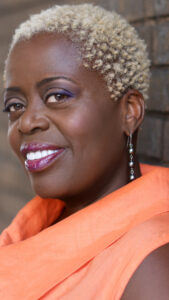
Before we get into the interview, White has made a name for herself on stages around the world. In addition to her role as Sonja in The Life, White has appeared on Broadway as Effie White in Dreamgirls, Mama Morton in Chicago, Grizabella in Cats and Funmilayo in Fela! In Los Angeles she appeared in a production of August Wilson’s Ma Rainey’s Black Bottom in the title role.
What follows are excerpts from our conversation that have been edited for length and clarity. The interview was very enjoyable and I had hoped to post the video, but she asked me not to due to the incessant attention she was getting online. The end result is a slightly longer interview than I usually post, but hopefully an enjoyable one.
Since we’re doing this post-show, what are your post-show rituals?
Our post-show rituals depends on the night. Tonight is Thursday night. So we had an early show tonight. We had a 7:00 show. On Tuesday nights I come straight home because I have two shows on Wednesday. But on Thursday night I will have a glass of wine. And maybe not. And I cook something to eat. I feed and take care of my animals. I have a dog and a cat. I just relax and chill and maybe watch a movie, maybe watch something on TV. I try not to watch the news too much because it makes me sad. But I watch the news enough to keep up with what’s going on in the city and in the world.
My post-show rituals on other nights include coming home and getting something to eat, taking a bubble bath with candles lit and just kind of taking off the day and getting ready for the next day. When you’re in a Broadway show you pretty much live for the show. Everything you do is to prepare and to be prepared for the show the next day, over the next two days, over next week. So that’s what I do. I try to take care of myself.
I saw Hadestown on Broadway before it won the Tony Award. When I first heard that you were taking on the role of Hermes it answered the question that I had as to whom could possibly replace André de Shields? I know that a friend suggested this part to you and said you should think about this. At what point did it make sense to you? What was your response when the producers said it makes sense to us, too?
Susan Davison and I were sitting right here at this table, I believe, and we had heard that André was leaving. I said I’ve got to do that role. I only said that because I’d seen the show opening night and I just thought it was a magnificent show. It was very moving. It was very timely. It has a lot of very important messages for the world that we’re living in today. I just thought, Oh, I’d love to do that role. I didn’t think anything else of it. I really just didn’t dream of it.
So Susan said, “Well, you should call your agent”. So I did and my agent said, “Wow, that’s a great idea, Lil. I’ll talk to the people.” They thought it was a great idea and that’s how it happened.
That is the best possible example of going for what you want.
And positive thinking because the word “no” never came into my mind about this. It just didn’t. I’m not being egotistical or anything like that. I just thought it would be a great idea.
You saw the show from the audience’s perspective. Now that you’re on stage and have been doing it for a number of weeks, has your perspective on why the show works as well as it does changed? Do you have new insights as to why Hadestown resonates as much as it does?
As Hermes I get to see it a lot from my own perspective. And I think that it’s moving, it’s an emotional ride and it speaks to the times that we’re living in. Even though based on mythology, there’s a lot of truth in what’s being told on the stage in Hadestown. The actors are bringing it. They are giving you the truth of the story.
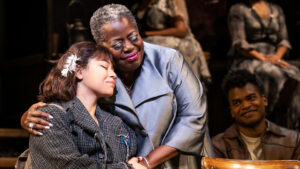
I keep saying it’s timely. They talk about building a wall. Why would somebody build a wall to keep other people out? Who are the people being kept out? It’s the love and the caring for someone and the self-doubts that we all have from time to time, maybe on a daily basis, maybe not. But we all have some doubts about what we can do to make our dreams fulfilled. And so there are lots of things that I see now because I’m on the stage.
I see and I hear that rumble of Hades voice every night. I see the love between the Eurydice and Orpheus every night. It’s really, to me, a demonstration of what our realities can be if we pursue them, if we pursue the right kinds of things. It’s a different perspective watching it every night, watching the workers every night sweating. I get to see that every night and I get to look at the audience. I get to watch them watch the show and it’s very telling. I mean, I saw a man in the audience and, to me, he could have been the devil because of the way he was responding to a particular moment in the show. It could be my imagination, but maybe not.
You and André got to work together in a musical a lot of people don’t know about called Gotta Dance (2015). As the baton got passed from him to you did you have any conversations with your former stage mate or did he offer any advice to you?
We talked very briefly and he’s thrilled for me as I am thrilled for him to, too. He’s moving on to a wonderful show, Death of a Salesman. One of the things that he said to me that I really held on to was it’s a lot of work. When he said that I was just beginning rehearsals.
Now I really understand what he meant because the role is not just standing and reciting and telling the story and moving the story along, but it’s also remembering cues about props. Then where to stand and where to walk and when to say what. It’s a lot of mental work. What I’m finding is that this is not one of those shows where you can kind of walk through it. You have to really be in it and be aware of what’s happening in every second – which you should do anyhow.
I don’t like to walk through anything. I like to be in the moment, every moment, because that’s what translates to the audience. That’s how you get people to understand what the story’s about and to see the characters that you’re portraying. I think that you have to stand in them, go 50/50, because, of course, you have to be who you are – your personal self has to be in the mix there to portray the character. You have to give 100% every time because every night, every show, there’s someone there who’s never seen it before.
I don’t want to rehash the challenges that you’ve been through in the last week and a half or two weeks.
No, we’re not going to talk about that.
But I want to know from an actor’s perspective what are the challenges of keeping all that noise outside and not let it impact the work that you want to do?
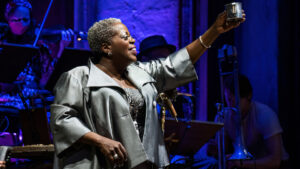
I think the blessing of it is that I do have a character to portray. So I can throw myself 100% into that character and forget about all this other stuff. Because in the scheme of things, the people who come into the show to watch the show the next day and the next evening, they don’t want to know about any of that. They want to see the show. They want to know what happens to Eurydice and Orpheus. They want to know what Hades has to say. They want to see what Hermes is going to do.
So I don’t want to bring any of that into what I’m doing on a daily basis. There are certain things that are going to be addressed. And they should be. But that’s that.
How do you, with all of the distractions, find happiness at this point?
Listen, I am blessed. I’m a mother, a grandmother. I have pets. I have plants. I live in a beautiful apartment in New York City. I’m healthy and I’m loved. So that’s what keeps me going. I’m loved and I know that without a shadow of a doubt. So with all of this other stuff that has been happening, this is what I know for sure. That tiny little bit of people who don’t, don’t count. Because I’m only coming from love, you know? I think that’s one of the things that really keeps me going and keeps me grounded.
What excites you most about still being on stage at this point?
Oh, it’s always the work. The play itself. The music. Listening to these wonderful musicians on stage and the audiences. During the lockdown I did some work here in my apartment with my music director and we did several performances that were videotaped and live streamed. It was fun and it was good, but there’s nothing like having people in the house or people in the audience.
Even if I had people here in my apartment it would be nice. It’s the people; the reactions and the interchange of energy. Whether you’re a jazz singer or blues player or an actor who does acting and doesn’t sing, or whether you’re somebody who only sings and doesn’t act, whether you’re a dancer or a painter or a sculptor, it’s about people witnessing what you do and their reaction to it. It’s tied to your heartstrings and that’s what does it for me.
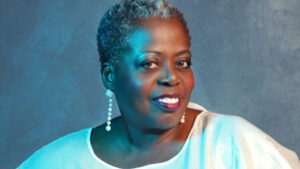
it’s interesting that you said “whether you’re a jazz singer or not,” because I came home from running some errands today and I listened to TSF Jazz radio out of Paris. The first person that came on was Dinah Washington, whom I happen to love dearly. I was thinking, God, I would love to see a show about her. Then when I found out we were talking two hours ago and saw that you did Dinah Washington, I thought I have to ask you about her.
She’s a heroine of mine. She was a force of nature. She was a business woman, she was a tough cookie and she demanded excellence from everybody around her. I loved playing her because I got to play an icon – a really wonderful iconic figure in Black music who didn’t stand for any mess. She did what she wanted to do in terms of the music. She spoke loudly about civil rights and she contributed to the success of the civil rights movement. She wanted things the way she wanted things and so she had it that way. I loved playing her.
In December of 2000 Stephen Holden in the New York Times wrote a review of your cabaret performance. He said, “Listening to this gifted theatrical pop soul singer, it is easy to wish that belters like Patti LaBelle and Aretha Franklin would show a similar sense of balance and sensitivity.” When you aren’t just reviewed favorably in their company, but set up as an example for them, what goes through your mind?
That’s the first time I ever heard that quote from Stephen Holden. Stephen Holden has written me many love letters and I’m really very happy that he gets me.
I’m speechless to be honest with you because these are the people that I grew up listening to. I think they’re brilliant, not just singers, but brilliant musicians in the way that they can turn a song and make it palatable and make it honest. I feel like that’s the best way to be as an artist – to be honest. If I’m honest with what I’m doing the audience is going to get it.
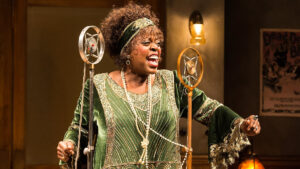
In August Wilson’s Ma Rainey’s Black Bottom here in Los Angeles you acted more than you sang. What did you like most about that role and about being part of that production?
What I liked most was the acting, the ability to bring that character to life. I love to sing, obviously, but there are other aspects to my artistry and I like being able to explore that part of it. I felt very fortunate to have the brilliant cast that we had and to have Dr. Phylicia Rashad as the person leading the helm. She really helped me so much get into that character and make it real, make it truthful.
So let me ask you something about risk taking. I’ve been a longtime Fela Kuti fan and I when I saw Fela! in New York I thought it was a brave show for Broadway. The show ran 463 performances. In an environment where pre-sold entities are given top priority I love the fact that a show like Fela! could be on Broadway. Do you believe Broadway can be as equally brave today as it was when Fela! was put on stage?
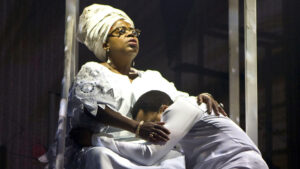
I absolutely do. I think it just takes brave producers who are willing to put their money where their mouth is. Fela! was something that made people a little bit uncomfortable. They stand up and dance a little bit. You had a man with his shirt off smoking weed on a stage. You had a man with 27 wives saying these are all my wives. And you had a woman, me, playing a ghost. She was literally a ghost of his of his mom coming back.
It wasn’t your typical Broadway show, but I think that that’s what makes the world go round. We can portray the sharp edges of humanity, of intelligence, of art. I think it’s important for us to view and experience all of it.
We have to open our minds because the world is so big now. It’s big and it’s small because we can travel from here to Japan in a day. People’s ideas change about marriage, about the feminine and masculine and all of that. There’s so many different things that are going on. We have to keep up.
When you received the Tony Award for The Life I loved the dance that you did. I revisited this today and was moved when you thanked your grandmother for putting you on the table to show your family your talent. If your grandmother could see you on stage in Hadestown today, what do you think she would say about everything you’ve accomplished so far in your career?
Oh. [She takes a minute before continuing.] I think she would say “You did good, baby.” I think that she would probably not love everything that I’ve done so far. I don’t suspect that my grandmother would have loved to have seen me in The Life, but my mother did and my Aunt Lillian did and my uncles and my aunts and my cousins. Everybody in my family who came to see it understood that this was my job to play this role. I don’t know that my grandmother would like that at all. But right now she’d be very happy.
And what would you say to her?
Grandma, thank you for coming. Thank you for coming, Grandma. Are you hungry? You want to eat something? Because she would do that for me. She’d say, “Baby, that was good. Baby, you’re hungry? You want to eat?” Yeah. She’d feed me and give me kudos – as with all of my elders in my family.
With that Lillias White’s dinner was just about done. Our planned thirty minute conversation had lasted over 45 minutes. To think, three hours earlier that day it wasn’t something either of us imagined doing.
Main Photo: Lillias White in Hadestown (Photo by Matthew Murphy)
Update: In an earlier version of this story, we posted that Fela! 28 performances. That number was inaccurate. It has been updated to reflect the actual run of 463 performances. Cultural Attaché regrets the error.











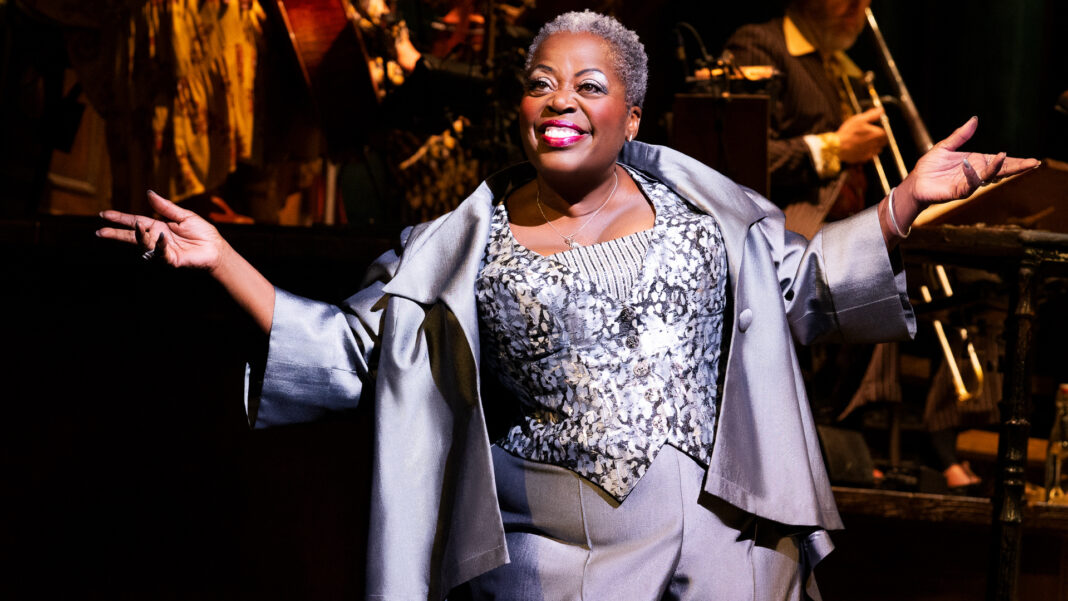
Lillias White’s performance in Dinah Was is the stuff of LEGENDS. It was incredible. I’m seeing her in Hadestown Saturday. Can’t wait. Also, Fela ran a lot longer than 28 performances.
James: You are correct. We have updated the post to reflect the run of 463 performances. Thank you for reading!